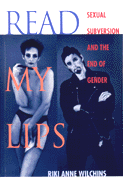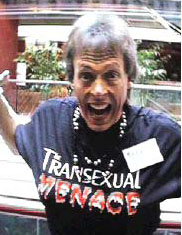
Read My Lips
Sexual Subversion and the End of Gender
Riki Anne Wilchins
Firebrand Books, Ithaca, New York, 1997
ISBN 1-56341-091-7 Paperback $16.95
ISBN 1-56341-091-5 Hardcover $28.95
Reviewed by Jamie Faye Fenton |
I have been looking forward to this one all summer. Riki Anne Wilchins is an intriguing person: Energetic,
enigmatic, opinionated, ambiguous, intensely political. Riki radiates a 120 decibel provocative attitude. Her
ideas are interesting, and to my analytic mind, certainly wrong. I want to learn more so I can challenge her
to a debate; maybe even toss a pie "In Her Face.”
The package comes. Inside is a 6.5" x 8.5", 232 page paperback book with two shots of Riki on the cover, as
a garter belt femme and a leather-clad butch. The full title: Read My Lips, Sexual Subversion and the End
of Gender. While I love the photos, adore Sex and Subversion, I am fervently hoping that Gender does not
End.
I dive in and jump around. It didn't expect this.
The history and photographs draw me in. I get out my highlighting marker.
Riki Anne’s Ride
Read My Lips is many things. A biography of Riki Anne, an account of the transexual experience, a
compendium of earlier writings, a primer on postmodern philosophy and gender theory, and both a history
and a manifesto of a new political movement. As these themes are interleaved, I must untangle them to
summarize.
 Riki Anne began as Richard. A survivor of incest initiated by the father. Family, school, friends, all try to
inculcate the masculine. The download fails.
Riki Anne began as Richard. A survivor of incest initiated by the father. Family, school, friends, all try to
inculcate the masculine. The download fails.
Riki transitioned and underwent SRS in Cleveland in 1980, when gate-keeping was even worse. Transexual
lesbians were not supposed to exist. Transexuals were seen as male freaks and unwelcome in women’s spaces.
Riki’s incest survivor support group goes into turmoil when a pre-op is revealed. Why would a caring,
supporting group wish to exclude someone who is in almost every way just like them? This leads her to
consider the many other trans-people she knows who are pushed to the margins, suffer, and die. While often
the subject of study by outsiders, none of the research products have made trans-persons lives better.
Eventually it hits her: "I am trapped in the wrong culture - not the wrong body." Trans-identity is a political
category whose tyranny must end. To deal with the pain, and to make sense of her life, Riki Anne starts
thinking and doing.
A Politics Beyond Identity
Social Categories
Being thought of as "tall" is a simple example of a social construction. The category of "tall" exists only
because people are making comparisons. Gender is also a social construction, a product of the judgments of
others. For a transexual, life is a gauntlet and being read is a hatchet-blow. Bodies, like clothing, are the
subject of fashion.
The varieties of intersexuality illustrate that the two standard categories of male and female leave much out.
The perception of these categories is a product of gender seeking an explanation in our bodies.
Sex is a product of gender - not the other way around - we are seeing what we are taught to expect to see.
The Cultural Invention of Homosexuality
Queer philosopher Michel Foucault is best
remembered for presenting the concept of Power as a productive and regulative constituent of culture: The
Influence of Actions on Actions. An example of its deployment is the modern invention of the category of
Homosexuality. Along with the identity and its benefits we get juridical structures - cultural mechanisms for
determining who is included in a category and how they are permitted to behave. This is the trap: giving a
group an identity marginalizes others and lays the groundwork for regulation. We can see this in the current
state of the Gay Liberation Movement. As their cause is advancing, they move to the center, often forcibly
excluding constituents like the drag queens who started it all at Stonewall. It was more fun in the radical
beginnings.
The Limitations of Identity Politics
Most political groups define their constituents as an
"identity" - a move that excludes others that fail the definition. For example, a gay group may claim they are
about sexual orientation, not gender, which glosses over the fact that partner selection is a gendered act.
Any determination of identity introduces an "us and them" binary opposition. Extending the definition to
include more terms still creates "thems". Identities produce winners and losers. Goal: a politics beyond
identity, one that declares oppression as the real enemy.
Gender and Our Bodies
Gender is special. Unlike other categories, gender goes to the core of our being. Is it an essential part of ourselves?
At lesbian gatherings, Riki gives a "Show and Tell" workshop - its latex glove time! All observers concur:
"its a cunt all right" and that usually wins them over. But consider non-op Holly Boswell. Why is she
anything less? And what about Intersexuality? Genital ambiguity causes discomfort and is a major cause of
loneliness. Why must we gender our genitals? SRS technology favors appearance over sensation. Why can’t
we have SRS to become an intersexual?
 Junior High health class curriculum illustrates how cultures attach meanings to the body. These meanings
are confused for trans-people: they do not bind to the right places. The social police use shame, and then
violence, to force us to match. Trans-people react by playing along and burying feelings which are
unearthed later. Can there be a way to organize yourself without identity?
Junior High health class curriculum illustrates how cultures attach meanings to the body. These meanings
are confused for trans-people: they do not bind to the right places. The social police use shame, and then
violence, to force us to match. Trans-people react by playing along and burying feelings which are
unearthed later. Can there be a way to organize yourself without identity?
The Subjective Experience of Gender
Is not gender identity grounded in feelings about yourself? Do not people "feel like a woman" or "feel
like a man"? Two usual arguments are: gender identity naturally exists; or that it flows from the natural
body. Problem: other categories don’t work this way - and such explanations can’t explain why an
androgynous female reports feeling "like a woman" when wearing woman’s clothes.
Even the fundamental interpretation of our perceptions requires us to think using symbols assigned by
culture to combine and synthesize concepts taught by culture. Even our bodies themselves are converted
into symbols. For example, bras and skirts are cultural tools and symbols that impose femininity on young
women. These garments have the dual role of constraining feminine activities and functioning as cultural
signs which eroticize the body. When we wear something or think something, culture does a magic
trick, creating the illusion of an essential gender identity.
You can’t fight language - it is crucial for social functioning and cognition. Gender is a performance on the
social stage. In an exhausting form of "method acting", trans-people adapt emotional camouflage. Part of
the transition process involves learning to re-read your body. Before then, many trans-people seek the
"other" gender in other’s bodies.
We do not seek a "Gender-Free America" - or world; rather the freedom to choose our meanings.
Eroticism
The Erotic is treated by western culture as a pseudo-science.
Other cultures create an art of the erotic. Neither works perfect. Gender includes "what turns
us on" and "what gets us off". In the erotic, diferences abound: hard/soft, top/bottom, femme/butch,
penetrating/penetrated. Sex is the vicarious experience of the other. Even here, meaning seems to have
priority over sensation. "The erotic is grounded on power difference; proclaiming what to show or hide,
give or withhold what is legitimate, and what is pleasurable. It erases bodies, acts, and desires which do not
meet its aims."
A Chronicle of Menace
Interspersed is the recent history of gender-activism, rendered in narrative and through the superb photographs of
Mariette Pathy Allen. It is an inspiring story. Here is some of it.
- The Birth of the Menace takes place in Michigan in response to the ejection of a TS from the Michigan Womyn’s Music
Festival because she was not a "womyn born womyn". In response, Camp Trans opened across the road ,
and in 1994 a group of trans-people went into the festival and were cheered.
- Janice Raymond wrote a book called The Transsexual Empire which made the preposterous
claim that transexuality is an incursion by the patriarchy. The existence of FTMs and the many varieties of
gender-variant women refute this. A Menace statement (and a debate at a Manhattan bookstore) gets the
point across.
- The Gay Games had a policy regulating TG participation in athletic events reminiscent of the
HBIGDA Standards of Care. The Menace fixed that in short order.
- Transclusion: The ongoing battle to have trans-people included along with the gays, lesbians, &
bisexuals in events, organizations, and legislation.
- Trials and Vigils: The Menace has been a presence for our community’s victims of
discrimination, assault, rape, murder, and unwarranted prosecution. A list way too long.
- Lobby Days - In several forays, trans-people have visited Washington in organized efforts to
educate lawmakers about gender-based oppression.
Riki Anne Today
Joan Nestle, a mentor, asks Riki: "Where do your selves meet?" How do a lesbian, pre-op, a woman, a
femme, an addict, an incest survivor, a post-op TS intersect? She wants her body back. At the sex club it all
comes together in a 3 way sex scene with Riki Anne in the middle. She relives each identity, the pain and
ambiguity. Intensity builds and the rational recedes. She comes.
Riki Anne is the executive director of GenderPAC - which stands for Gender Public Advocacy Coalition, a
group composed of individuals and organizations, "dedicated to pursuing gender, affectional, and racial
equality". Her recent involvements include demonstrations against IGM, the genital "corrective surgery" of
intersexed infants; and the protest of the rape of a Haitian immigrant by several New York City police
officers.
Riki concludes with an Interview of Herself - which asks and answers most of the hard questions that come to mind.

Response
I went into this sparring for a debate. I came out dizzy. The book goes round robin: personal experience,
political act, theory, …, about 7 times. These orbits pulled me through my own past and its alienations. I
won’t be the same. Just like Riki, not even a long list of labels can pin me down. Now I know I don’t need
to be.
Q: What do you get when a Postmodernist joins the Mafia?
A: An offer you can’t understand.
Riki Anne did it right. She accurately presents basic postmodern philosophy. Gender is an excellent venue
for this. Her method of going from the bottom up, intermixed with accounts of her past and present actions,
helps ground the theory in life, essential for getting it across in 5,000 words or less to a popular audience. It
keeps it moist too.
Some of it still seems strange. Here are some lingering thoughts:
- How can the concept of a category, which seems fundamental for cognition, be some sort of dark force?
Categories don’t oppress people; People with categories oppress people. Thinking without them is autism.
- The assertion that sex is a product of gender also riles me. Us science nerds
have known about
intersexuality for a long time. The evidence for brain-sex is overwhelming; it is just like sex everywhere
else: two discernible main clusters with a small percentage of interesting variations. While science is part of
culture and works by its rules, it is also committed to the notion that "the truth is out there" - and so am I.
-
For transgenders to exist, doesn't the software (of culture) have to conflict
with the wetware (of the brain) somewhere? Are there diferences between trans-brains and others?
Could variation in brain structure account for variations of essential gender identity?
-
Read My Lips is missing an analysis of the utility of political identities. If oppressive categories evolve in
cultures, who benefits? While often the answer is obvious, the payoff for oppressing gender variance is not.
If you can show that nobody wins, then such cultural parasites are stupid and easier to squash. If there are
winners, then knowing who they are informs strategy.
-
Riki wrote this book targeting the queer-radical audience. While an easy first conquest, the real battle is to
change the mainstream point-of-view. In-your-face activism won’t work for this. It is time to start thinking
Peoria.
-
Riki says nothing about the divisions in the trans-community itself. While we are all thankful she didn’t
roast Tri-Ess, these divisions do exist and sting hard. Our conservatives are not the only culprits.
My big insight: The mind/body distinction is just another false binary opposition. Sex and gender are not
two different things. Virginia Prince is wrong. It really is a rainbow all the way down.
Conclusion
I found this book most worthwhile and recommend it. You will learn about yourself.In honor, I propose a brand-new
category, just for Riki Anne: she gets to be the original Transcend-Gender Activist. May she inspire many more.
-- Jamie Faye Fenton  Comments: jamie@tgforum.com
To learn more about the concepts and context for Read My Lips, visit some of these links.
Read My Lips includes 18 Things You DON'T
Say To A Transexual, or more precisely a list of 15 common questions and comments made to
transexuals and what they reveal about the attitudes of the interlocutor.
Also part of the anthology is Click -
Hello?, a metaphoric telephone run-around.
Riki Anne has other writings available on the Transgender Forum web site.
For more, visit the GenderPAC web site
Riki’s friend Nancy Nangeroni also tracks events in the
trans-activism area.
Kate Bornstein and
Martine Rothblatt are two other noted transgender writers
with similar ideas.
Pat Califia's recent Sex Changes is a meticulous analysis of transgender politics.
Read My Lips draws upon the ideas of
Michel Foucault, particularly his
The History of Sexuality,
deconstruction pioneer Jacques Derrida,
and especially those of Berkeley professor Judith Butler.
Mary Daly and
Janice Raymond
are two well-known hostile feminist critics of
transgenderism, unfortunately with minimal web presence. Nancy Nangeroni wrote an
excellent review
of Raymond’s Transsexual Empire. Another critic, Andrea Dworkin, has more of her writings
on-line, alas on a slow server.
There are many critics of Postmodern Philosophy. One amusing send-up is Chip Morningstar’s paper How To Deconstruct Almost Anything. Last year
the nerd vs. fluffy war really got going with the Social Text Affair, which began as a
hoax but has sparked much thoughtful reflection.
Photo credits: cover photos by Mariette Pathy Allen. The Genderizer Bunny and Jamie Menace photos by Jamie Faye Fenton.


 Riki Anne began as Richard. A survivor of incest initiated by the father. Family, school, friends, all try to
inculcate the masculine. The download fails.
Riki Anne began as Richard. A survivor of incest initiated by the father. Family, school, friends, all try to
inculcate the masculine. The download fails. Junior High health class curriculum illustrates how cultures attach meanings to the body. These meanings
are confused for trans-people: they do not bind to the right places. The social police use shame, and then
violence, to force us to match. Trans-people react by playing along and burying feelings which are
unearthed later. Can there be a way to organize yourself without identity?
Junior High health class curriculum illustrates how cultures attach meanings to the body. These meanings
are confused for trans-people: they do not bind to the right places. The social police use shame, and then
violence, to force us to match. Trans-people react by playing along and burying feelings which are
unearthed later. Can there be a way to organize yourself without identity?